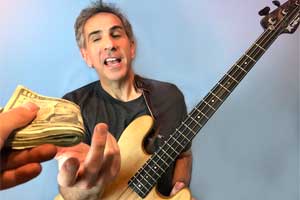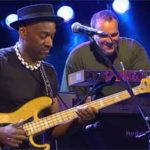Is there anything you wouldn’t play for money?
January 17, 2019
This week I had the privilege of publishing a very enjoyable interview I did with Austrian bass virtuoso Bernhard Lackner during a trip to Germany. It was a spirited conversation, in which Bernhard shared his feelings about how he discovered what he really wants to musically, and how he’s focusing on a very specific, well-defined approach to composing and recording.
Bernhard is a great bassist, capable of doing just about anything he sets out to do on the instrument. Having released several excellent records as a leader, he’s got the seasoning and musical maturity to move forward with total confidence in any direction he chooses. Resisting the urge to put out a bunch of “bass records,” Bernhard’s music is more song-oriented, “all about the music,” he says. He’s resolved to stay authentic and concentrate on what he truly loves to do.
We also talked about the other side of that coin, how some musicians develop of a fear of being typecast. Oftentimes, an angst-ridden player in this scenario expends untold amounts of time and energy striving to become a well-rounded musician, with equal “grooving-prowess” in a virtually limitless number of styles and settings.
The dialogue reminded me of my heyday as a working bassist. Though I don’t recall worrying too much about being pigeonholed, I did subscribe – for whatever reason – to the do-it-all school, taking every gig I could get. Playing both upright and electric helped a lot, as did being a strong sightreader. I felt duly qualified to do symphony gigs that required strong arco chops, as well as Broadway shows, bebop gigs, and situations that called for slapping, fretless, even singing (which has never been my strong suit!). I’ll never forget the time a friend and fellow bass player looked me in the eye and called me “a bass prostitute.” Despite the fact that the connotation was, shall we say, less than honorable, I realized he was basically correct – in his own way.
When it comes to being a working bassist, each philosophy has its own merits. On the one hand, maybe we can argue that we have a responsibility to identify our “true calling” in order to cultivate a well-defined craft. On the other hand, can we live on the opposite end of the spectrum, guilt-free, without being accused of “selling out” and becoming a bass prostitute?
Have a thought on the subject? Leave a comment and let me know what you think.
In the meantime, check out our interview with Bernhard here.






Yes, there’s a risk of being a “Jack of all trades, master of none,” but if you’re passionate about all the different genres you play and in which you choose to excel, than you’re not a sell-out. In either scenario, if your heart isn’t in it, than worse than a sell-out, you become a burn-out. For me, the variety of styles and gigs prevents burn out and helps keep my music life more interesting. Furthermore, the Jack of All Trades can, depending on the individual, play many styles at an 80-90% mastery (vs. the near 100% level of a “master”), but the difference between 80 and 100% is barely noticeable by musicians who hire him/her and is often not important when all the factors of hiring are at play (i.e. musicality, sound, groove, time, attitude, likeability, gig/rehearsal preparedness and promptness, etc.) The difference is even less discerned by non-musicians.
Regarding being a bass prostitute – in the infamous Austin, Texas music scene there was a lot of work for a bass player back in the day (as the saying goes) and I was blessed to be a part of that for many years. At this point in my life, playing different styles of music is an experience to me and the money part isn’t as important. I went from playing blues and rock to zydeco, then contemporary Christian music, jazz and some classical (our band leader is classically trained). I see all that as a blessing, opportunity, and a happening – all this has made me a better bass player and now, a better teacher. Thanks Jon!
I would not play for a cigarette commercial.
Wouldn’t get onstage with Ted Nugent for any amount of money. I’d do the Baby Shark soundtrack session 100 times before I’d allow myself to have anything to do with Nuge.
“prostitutes” are not only the world’s 3rd oldest profession (I put “hunting” and “gardening”) first and second) but they are honored and respected in both traditional history and in the Judaeo – Christian bible. So for a musician to be considered a “prostitute” should be considered an honor to one’s skill and experience in securing paid employment.
I’ve been a “prostitute” (bass guitar) for 48+ years and am proud of that. I find people who aren’t willing to pay me for my efforts (and I teach as well) aren’t worth my time or concern.
I play all styles that come along my way and I believe it has rounded me out and allowed me to bring more unique flavors to different styles of music. I was session man with a group os 5 artist each playing different styles traditional and Celtic music. I was able to bring in jazz motifs and other sounds that blended in very well, despite it being all about the differences in these styles. For me, the more styles I play, the larger my quiver of ideas to bring to a gig.